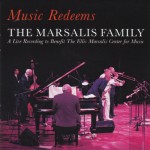 The family band has been a cornerstone of the American entertainment industry since the 19th Century, when singing families became the first domestic music stars. There’s something magic about the way blood relatives interact with each other spiritually and instinctively rather than technically. This is even more important in the African-American music tradition, in which musicians have learned from their relatives for generations. That special relationship is much in evidence on Music Redeems. Liberated from the critical necessity to make a Big Statement or define some new trend, the Marsalis family’s only agenda here is to enjoy playing together.
The family band has been a cornerstone of the American entertainment industry since the 19th Century, when singing families became the first domestic music stars. There’s something magic about the way blood relatives interact with each other spiritually and instinctively rather than technically. This is even more important in the African-American music tradition, in which musicians have learned from their relatives for generations. That special relationship is much in evidence on Music Redeems. Liberated from the critical necessity to make a Big Statement or define some new trend, the Marsalis family’s only agenda here is to enjoy playing together.
The occasion is a live concert at the Kennedy Center in Washington, D.C., honoring family patriarch Ellis Marsalis for receiving the Lifetime Achievement award from the Duke Ellington Jazz Festival. The family made a similar album in 2003, also a live concert recording honoring Ellis, but this one is better.
The surprise star of the record is Jason Marsalis, who demonstrates how much his total concept has matured with an outstanding performance on vibraphones, drums and, of all things, whistling. His breathtaking doubling with Wynton’s trumpet on Charlie Parker’s delightfully tricky “Donna Lee” is so well articulated that I thought I was hearing a flute on first listen. The band plays together beautifully on a familiar tune, James Black’s lilting “Monkey Puzzle,” which is illuminated by Jason’s vibe solo. Ellis follows with a thoughtful solo piano construction, “After,” then another of his compositions, “Syndrome,” built around a stately theme. Wynton’s trumpet solo opens the song’s exposition with a jaunty fair as the rhythm section goads him, and Ellis dances across the keyboard in response.
Harry Connick, Jr. joins in for a broad, two-piano reading of “Sweet Georgia Brown,” then offers a lengthy spoken tribute to Ellis which is the album’s only blemish. On an otherwise flawless technical recording, Connick’s speech is recorded at an appreciably lower level than the rest of the record, making it an irritating distraction in the flow of the program.
The band proceeds with a perfectly crafted interpretation of Thelonious Monk’s difficult piece “Teo,” featuring excellent solos from Branford, Delfeayo and Wynton, who rallies through an extra chorus, playing off his own lines. Ellis Marsalis III’s spoken word tribute to Ellis follows much more successfully than Harry’s as he ruminates on aspects of his dad’s personality from “ass whipping” to “beacon.”
Jason’s expansive “At the House, In Da Pocket” pulls the performance to a climax as the individual band members trade fours in an entertaining exchange that builds to single note exhortations and then breaks into exciting collective improvisation and riffing, a glorious interlace of ideas that reach back to the earliest traditions of jazz while sounding wholly contemporary. The encore is pure party time. Wynton’s trumpet provides the piercing clarion call for “The 2nd Line,” and the palpable crowd noise suggests that an audience that may well be dancing in the aisles. Definitely worth the price of admission, especially because all proceeds go to funding community programming at the Ellis Marsalis Center for Music, soon to open at the Musicians’ Village.




